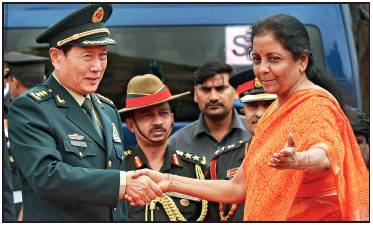India, China chart route to avoid future Doklams
Date:- 24 Aug 2018

Rajat Pandit
India and China have decided to work towards reducing troop confrontations along their unresolved border with better implementation of confidence-building measures, additional border personnel meeting (BPM) points, greater interaction between local commanders on the ground and “early operationalisation” of the top-level hotline between their militaries.
The two countries also decided to expand the engagement between their armed forces in terms of training, joint exercises and other professional interactions as well as draft a new bilateral MoU on defence exchanges and cooperation to replace the one inked in 2006.
But sources said China brushed aside India’s concerns over the China-Pakistan Economic Corridor (CPEC), which passes through Pakistan-occupied-Kashmir, during the delegation-level talks led by defence minister Nirmala Sitharaman and her Chinese counterpart General Wei Fenghe here on Thursday. “China insisted the CPEC was not directed against any country and aimed at overall economic growth of the region,” said a source.
India has repeatedly stressed that the so-called CPEC, which connects China’s Xinjiang area with the Chinese-built Gwadar deep sea port in south-west Pakistan through a network of highways, corridors and energy projects worth around $57 billion, violates its sovereignty and territorial integrity. “The presence of People’s Liberation Army troops in PoK is also a big concern,” said the source.
But China continues to stonewall India’s objections, much like it keeps on thwarting New Delhi’s bid to join the 48-nation Nuclear Suppliers Group as well as get Jaish-e-Mohammed chief Masood Azhar designated a terrorist by the UN.
As for the 4,057-km line of actual control, which has 23 “disputed and sensitive areas” stretching from Ladakh to Arunachal Pradesh, the two sides on Thursday decided to direct their troops to “maintain restraint” and not allow matters to escalate to the level that was witnessed during the 73-day confrontation at Doklam near the Sikkim-Bhutan-Tibet trijunction last year.
Defence minister Nirmala Sitharaman welcomes her Chinese counterpart General Wei Fenghe at South Block in New Delhi on Thursday
Rajat.Pandit@timesgroup.com
Courtesy: Times of India: 24 Aug 2018


